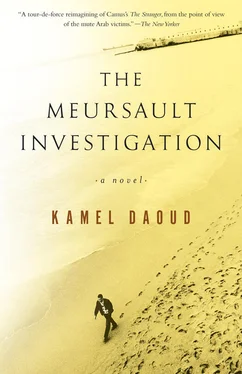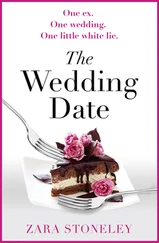By the way, do you know why Mama chose Joseph Larquais as the sacrificial victim — because you can say she chose him, yes you can, even though he came to us that night? It’s hardly plausible, I promise you. She explained it to me the day after the crime, while I was half asleep between two oblivious naps. Ah well, that roumi had to be punished, according to Mama, because he loved to go for a swim at two in the afternoon! He’d come back tanned, lighthearted, happy, and free. Once he came back to Hadjout, paid a visit to the Larquais family, and displayed that same happiness, which Mama, though busying herself with her housekeeping tasks, did not fail to find outrageous … “I’m uneducated, but I understand everything,” she declared. “I knew it!” I knew it . Knew what, exactly? God alone knows, my friend. But incredible all the same, right? He died because he loved the sea and was always too lively when he came back from it, according to Mama. A genuine madwoman! And I swear to you, this story has not been invented by the wine we’re sharing. Unless I dreamed that confession of hers sometime during the long hours of stupefied sleep that followed my crime. Maybe I did, after all. But nevertheless, I can’t believe she made up everything. She knew almost all there was to know about him. His age, his appetite for young girls’ breasts, his work in Hadjout, and his connection with the Larquais family, which didn’t seem to appreciate him very much. “The Larquaises used to say he was a selfish, rootless man who didn’t care about anybody. One day their car broke down and they were on the side of the road, waiting for help, when he came driving by, and do you know what he did? He pretended not to see them and continued on his way. As if he had an appointment with God himself. That’s what Madame Larquais told me!” I don’t remember everything, but I assure you, I could write an entire book on the subject of that roumi . “I never served him anything whatsoever. He hated me.” Poor Joseph. The poor guy fell into a well and landed in our courtyard that night. What lunacy. Such gratuitous deaths. Who could take life seriously afterward? Everything in my life seems gratuitous. Even you, with your writing pads and your notes and your books.
Go ahead, go on, I can tell you’re dying to, call him over, invite the ghost to join us. I’ve got nothing more to hide.
I find love inexplicable. The sight of a couple always surprises me, their inevitable slow rhythm, their insistent groping, their indistinguishable food, their way of taking hold of each other with hands and eyes at the same time, their way of blurring at the edges. I can’t understand why one hand has to clasp another and never let it go in order to give someone else’s heart a face. How do people who love each other do it? How can they stand it? What is it that makes them forget they were born alone and will die separate? I’ve read many books, and I’ve concluded that love’s an accommodation, certainly not a mystery. It seems to me that the feelings love elicits in other people are, well, pretty much the same as the ones death elicits in me: the sensation that every life is precarious and absolute, the rapid heartbeat, the distress before an unresponsive body. Death — when I received it, when I gave it — is for me the only mystery. All the rest is nothing but rituals, habits, and dubious bonding.
To tell the truth, love is a heavenly beast that scares the hell out of me. I watch it devour people, two by two; it fascinates them with the lure of eternity, shuts them up in a sort of cocoon, lifts them up to heaven, and then drops their carcasses back to earth like peels. Have you seen what becomes of people when they split up? They’re scratches on a closed door. Would you like some more wine? Oran! We’re in wine country here, it’s the last region in Algiers where you’ll find any. The vineyards have been uprooted everywhere else. Our server doesn’t speak Oranian very well, but he’s used to me. He’s a force of nature who contents himself with grumbling when he serves you. I’ll just signal him …
Meriem. Yes. There was Meriem. It was the summer of 1963. Of course I loved her company, of course I loved to look up from the bottom of my well and see her face suddenly appear in the circle of the sky. I know that if Musa hadn’t killed me — actually, it was Musa, Mama, and your hero, those are my three murderers — I would have had a better life, at peace with my language on a little patch of land somewhere in this country, but that wasn’t my destiny. As for Meriem, she was very much alive. Can you picture us? Me holding her hand, Musa holding my other hand, Mama perched on my back, and your hero, loitering on all the beaches where we might have celebrated our wedding. An entire family, already hanging on Meriem like a cheap suit.
God, how lovely she was, with her bright smile and her short hair! It pained my heart to be only her shadow and not her reflection. You know, Musa’s death and the living grief it imposed on me altered my sense of propriety very early on. A stranger possesses nothing — and I was one. I’ve never held anything in my hands very long, I start to feel revulsion for it, I have the sensation of excessive weight. Meriem. A beautiful name, don’t you think? I wasn’t able to keep her.
Take a good look at this city. Like a sort of tumbledown, inefficient hell. It’s laid out in circles. In the center, the hard core: the Spanish façades, the Ottoman walls, the buildings the colonists put up, the administrative offices and roads that were built right after Independence; then you’ve got the oil wells and their surrounding architecture of wholesale relocation; and finally, the shantytowns. And beyond them? Purgatory, I imagine. Inhabited by the millions of people who have died in this country, for this country, because of it, against it, trying to leave it or enter it. I have a neurotic’s vision, I’ll grant you that … I sometimes think newborn infants are the dead of days gone by, come back like ghosts to reclaim their due.
Is he refusing to answer you or what? Well, you have to find the right formula, I don’t know it myself. Don’t be intimidated by his newspaper clippings and his philosopher’s forehead. Insist. You sure figured out how to go about it with me, didn’t you?
Well, I would have preferred to tell you all these things in their proper order. It would have been better for your future book, but too bad, you’ll be able to sort it out.
My schooling took place in the 1950s. A bit late, in other words. When I got admitted to school, I was already a head taller than the other kids. It was a priest — along with Monsieur Larquais — who had insisted to Mama that I should go to the school in Hadjout. I’ll never forget the first day, and can you guess why? Because of the shoes. I didn’t have any. For the first days of class, I wore a tarboosh and Arab trousers … and I was barefoot. There were two of us, two Arabs, and we were both barefoot. It still makes me laugh today. The teacher pretended not to notice, and I’ve been grateful to him ever since. He inspected our fingernails, our hands, our notebooks, and our clothes, but he avoided any reference to our feet. I was nicknamed “Sitting Bull” after an Indian chief in a movie that was showing in those days. I spent most of my time sitting around, dreaming of a country where people walked on their hands. I shone in school, I was brilliant. The French language fascinated me like a puzzle, and beyond it lay the solution to the dissonances of my world. I wanted to translate it for Mama, my world, and make it less unjust somehow.
I learned to read, not because I wanted to talk like the others but because I wanted to find a murderer, though I didn’t admit that to myself in the beginning. At first, I could barely decipher the two newspaper clippings Mama kept religiously folded in her bosom, the two reports on the murder of “the Arab.” The more I gained confidence in my reading, the more I formed the habit of transforming the content of the articles and embellishing the narrative of Musa’s death. Mama would regularly hand me the clippings and say, “Here, take another look, see if they don’t say something else, something you didn’t understand before.” That went on for almost ten years, that routine. I know, because those two texts are printed on my brain. Musa appears in them in the form of two slender initials, and then the journalist doles out a few lines on the criminal and the circumstances of the murder. Just try to imagine the level of genius required to take a local news item two paragraphs long and transform it into a tragedy, describing the famous beach and the scene, grain by grain. I’ve always loathed its insulting brevity — how could so little importance be accorded to a dead man? Now what more can I tell you? Your hero entertained himself with a newspaper clipping he found in his cell, while I got a couple of clippings thrust under my nose every time Mama had a crisis.
Читать дальше












